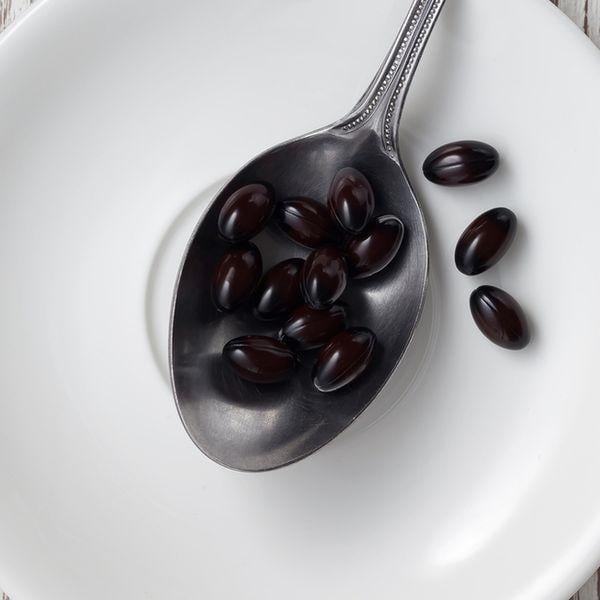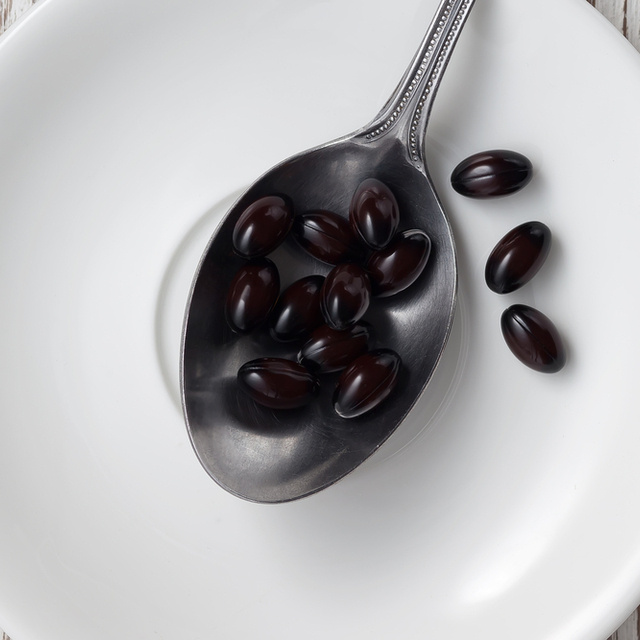Astaxanthin Benefits
The benefits of antioxidants have been studied for decades, bringing us a consistent flow of research on how these protective nutrients may give our cells reinforcement against free radical damage while supporting overall health and wellbeing. Antioxidants like vitamin C, vitamin E, lutein, zeaxanthin and beta-carotene are probably on your list of longevity-boosting nutrients already. But have you heard of the powerhouse antioxidant astaxanthin?
Astaxanthin is a carotenoid pigment and its antioxidant properties are thousands of times more potent than vitamin C. It’s one of the most powerful antioxidants out there, and it’s completely natural. In the same way that beta-carotene gives carrots their color, astaxanthin is responsible for the color of many of our favorite seafood fish and crustaceans. It gives sockeye salmon its color, and it’s found in krill, shrimp, crab, lobster, red trout and some algae. More and more researchers are homing in on the benefits of astaxanthin, and we're just in the beginning stages of uncovering its many uses.
The benefits of antioxidants like astaxanthin extend to the cellular level, helping protect your body from the negative effects of free radicals, which many experts believe may lead to serious health concerns over time.1 Your body is exposed to free radicals in several ways. They are a byproduct of many natural processes, like the breaking down of sugars for energy and the release of digestive enzymes. Free radical exposure also comes in the form of environmental pollutants and the breakdown of medicines.1
Benefits of Astaxanthin: What is Astaxanthin Good For?
Astaxanthin Skin Benefits
Astaxanthin provides antioxidant support for skin 2 and helps protect against changes to skin due to UVA exposure.3 Research also suggests that astaxanthin may help with skin quality and may provide anti-aging benefits for the skin3 including potential improvements in elasticity, texture, moisture levels and wrinkles.
Astaxanthin Benefits for Eyes
Astaxanthin is an ingredient found in some of the best supplements for eye health. It may help provide antioxidant protection for the eyes, boost retina blood flow, relax eye muscles and reduce fatigue.4
Astaxanthin for Weight Loss
Astaxanthin has become a recent focus in weight loss studies and it shows potential for supporting metabolic activity, reducing fat gain due to a high-fat diet and increasing fat use during exercise,5,6,7 although more research is needed.
Astaxanthin for Liver Support
As a powerful antioxidant carotenoid that accumulates in the liver, astaxanthin may help combat damage and provide support for liver health.8,9
Astaxanthin for Joints
Supplements containing astaxanthin may support joint health and reduce joint discomfort.10 Astaxanthin’s potential support for weight loss may also positively affect joint health.11
Astaxanthin for Cholesterol
Early research indicates that astaxanthin has potential for helping increase HDL, the "good" kind of cholesterol.12
Astaxanthin for Reproductive Health
Several studies and a clinical trial are looking at astaxanthin for support of male reproductive health, with promising results so far.13,14,15
Astaxanthin Skin Benefits
The benefits of astaxanthin for the skin are multifaceted. Researchers have discovered that dietary astaxanthin accumulates in the dermis (the skin’s thickest layer), and helps protect against the effects of harmful UVA rays. While both UVB and UVA rays can negatively affect your skin, UVA rays penetrate the skin more deeply than UVB rays. They reach all the way to the dermis and can contribute to signs of aging and skin-related health concerns. The accumulation of the carotenoid pigment astaxanthin in the dermis helps provide a reinforced barrier against that exposure, which may help reduce the signs of aging.2
Astaxanthin also benefits the skin through its antioxidant qualities, helping to protect skin cells from oxidative damage. Research also suggests that astaxanthin may improve the skin’s ability to retain moisture while helping with wrinkles, age spots, skin texture and elasticity when taken orally and applied topically.3
Astaxanthin Benefits Eyes
Macular carotenoids like lutein and zeaxanthin accumulate in the retina and help protect your eyes from damaging blue light rays, as well as age-related vision concerns. But astaxanthin may also benefit eye health by helping increase blood flow to retina capillaries, relaxing eye muscles, providing antioxidant benefits for the eyes and helping relieve eye fatigue.4
For these reasons, astaxanthin is often found in combination with other eye-healthy ingredients in supplements that support vision health like lutein, zeaxanthin, bilberry extract, and broccoli extract. You’ll find all of these vision-supporting ingredients in Swanson Health’s Vision Defense Formula. Read more about how to support your eye health in About Blue Light and Eye Health and Top Foods that Promote Eye Health.
Astaxanthin Benefits Weight Loss
While more research is needed on the benefits of astaxanthin for weight loss, there have been some indications that it may support metabolic activity,5 reduce weight gain associated with a high-fat diet and help fight fat accumulation in the liver.6 It may also increase fatty acid utilization and reduce triglyceride levels, and it may be particularly helpful for increasing the amount fat used for energy during exercise.6,7
Most of the studies performed thus far on astaxanthin for weight loss have involved mice, but results have been promising, making astaxanthin a potential focus for future weight loss and diet-related studies.
Astaxanthin Liver Benefits
Multiple factors are involved in liver damage but it's often associated with oxidative stress. As a powerful antioxidant, protecting against free radicals and oxidative damage is one of the most frequently-touted benefits of astaxanthin.8 It's even been called a “scavenger of free radicals,” and astaxanthin is reported to accumulate in the liver of mice.8 More studies (human studies in particular) need to be performed on the benefits of astaxanthin for the liver, but there are multiple indications that astaxanthin may help protect against liver concerns.8,9
Astaxanthin Benefits for Joints
Some studies show that supplements containing astaxanthin may support joint health, reduce discomfort associated with joint issues10 and provide an energy boost for muscles7 that may help them better support healthy joints. Astaxanthin’s potential benefits for weight loss may also contribute to healthier joints since weight concerns can affect joint health and knee health in particular. The force exerted on your knees is equivalent to 1.5 times your actual weight.11
Astaxanthin for Cholesterol
Early research suggests that astaxanthin may provide a positive effect on triglyceride levels and promote healthy cholesterol levels.12
Astaxanthin for Reproductive Health
Multiple studies and clinical trials have focused on astaxanthin for male reproductive health with surprisingly positive results.13,14,15 Again, experts say astaxanthin needs to be studied more closely and in larger trials before it can be recommended specifically for use in boosting male reproductive health.
How Much Astaxanthin to Take?
While there is no established recommended daily intake for astaxanthin, most astaxanthin supplements intended for daily use are available in quantities of 4mg-12mg. Using scientific research as a reference, astaxanthin has been used safely in intakes between 2 mg and 24 mg per day.16
Foods that Contain Astaxanthin
If you are looking for foods that contain astaxanthin, the redder the better! Most natural astaxanthin comes from crustaceans, but there are vegan options for astaxanthin including red yeast, which is made from rice.
Here are some natural sources of astaxanthin:17
- Krill
- Crawfish
- Crab
- Lobster
- Shrimp
- Red Yeast
- Algae
- Red Snapper
- Rainbow Trout
- Coho Salmon
- Atlantic Salmon
- Arctic Char
- Sockeye Salmon (contains more astaxanthin than other types of salmon)
- Pink Salmon
- Chinook Salmon
- Chum Salmon (aka Keta Salmon)
- Masu Salmon
Astaxanthin Supplements
Getting enough astaxanthin every day from food alone would be a challenge and this most likely wouldn’t leave enough room in your diet for nutritional variety. One of the most concentrated sources of astaxanthin is krill, but since we aren’t likely to start filling our plates with krill anytime soon, supplements that contain astaxanthin offer a simpler solution. Here are a few of our favorites:
- Astaxanthin & Zeaxanthin is potent antioxidant combination to support vision, brain and skin health
- Astaxanthin 4 mg is a natural astaxanthin complex sourced from the extract of microalgae Haematococcus pluvialis
- Krill Oil and Astaxanthin a krill oil that is easy to digest and doesn’t cause the fishy burp that often accompanies some fish oils
- High Potency Astaxanthin is an ultrahigh potency astaxanthin obtained from the microalgae Haematococcus pluvialis using an extraction method that does not involve chemical solvents
Astaxanthin Health Benefits
With so many potential benefits, astaxanthin is getting a lot of attention from scientific communities. Researchers continue to study this promising carotenoid, not only for its powerful antioxidant benefits, but also for its potential use in helping with a range of concerns including skin protection, eye health, weight support, liver protection, joint support, healthy cholesterol and male reproductive health. Astaxanthin supplements may have a lot to offer and you're sure to hear more about this antioxidant powerhouse in the years to come.
Learn more about the power of carotenoids in the article About Blue Light and Eye Health, and explore the differences between krill and fish oil in Krill Oil vs Fish Oil: Which Has More Benefits?

About Lindsey Toth, MS, RD
Lindsey is a nationally-recognized registered dietitian and nutritionist with a soft spot for pie. She empowers people to take charge of their health by finding the balance between the pleasure and nourishment in food. Her philosophy is that you should take care of your body because it’s the only permanent home you have. It’s what inspired her to pursue a career in nutrition.
*These statements have not been evaluated by the Food and Drug Administration. These products are not intended to diagnose, treat, cure, or prevent any disease.
Sources
1. Super Foods for Optimal Health. WebMD. Read source
2. Komatsu, T., et al. (2017). PloS one, 12(2), e0171178. Read source
3. Tominaga K, et al. Acta Biochim Pol. 2012;59(1):43-7. Read source
4. Kono, K., et al. (2014). Current Medicinal Chemistry, 14(2), 114–125. Read source
5. Kishimoto Y, et al. Mar Drugs. 2016 Feb 5;14(2):35. Read source
6. Lee, J., et al. (2011). North American Journal of Medical Sciences, 3(1), 13–19. Read source
7. Wataru, A., et al. Biochemical and Biophysical Communications. 366 (4), February 2008, 892-897. Read source
8. Chen, J. T., & Kotani, K. (2016). Journal of Clinical Medicine Research, 8 (10), 701–704. Read source
9. Shen, M., et al. (2014). Mediators of Inflammation, 2014, 954502. Read source
10. Park, D. R., et al. (2016). Journal of Medicinal Food, 19(12), 1196–1203. Read source
11. Why Weight Matters When it Comes to Joint Pain. Harvard Health Publishing. December 11, 2019. Read source
12. Hoi, H.D., et al. Plant Foods Hum Nutr 66, 363–369 (2011). Read source
13. Oral Astaxanthin and Semen Quality. Read source
14. Donà, G., et al. (2013). Marine Drugs, 11(6), 1909–1919. Read source
15. Comhaire FH, et al. Asian J Androl. 2005 Sep;7(3):257-62. Read source
16. Brendler T, Williamson EM. Phytother Res. 2019 Dec;33(12):3090-3111. Read source
17. Ambati, R., et al. Mar. Drugs 2014, 12(1), 128-152. Read source




